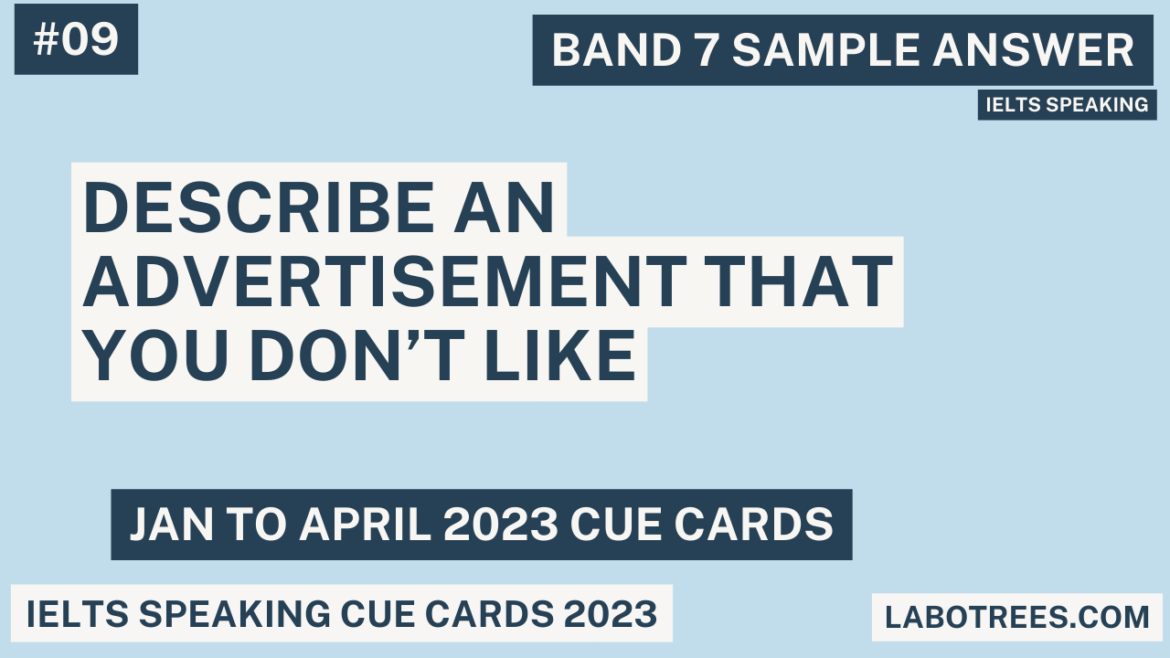Describe an advertisement that you don’t like
When did you see it?
What is it about?
Where you saw it/how you came to know about it?
Why didn’t you like it?
Sample Answer:
- An advertisement that I don’t like is one for a weight loss supplement that I saw on social media.
- I saw this ad a few months ago, while scrolling through my Facebook feed.
- The ad was for a weight loss supplement.
- It was claimed in the advert to help people lose their weight quickly and easily without any exercise or dieting.
- The ad featured before-and-after photos of people who had supposedly used the supplement and lost a significant amount of weight.
- I didn’t like this advertisement because it was misleading and dishonest.
- The ad implied that people could lose weight without any effort, which is not true.
- Losing weight and maintaining a healthy weight is a complex issue that requires a combination of healthy eating and regular exercise.
- Additionally, I felt that the ad was targeted towards people who might be feeling insecure about their weight, which is not a good thing.
- It was also not clear whether the supplement was safe to use, and whether it had any side effects.
- I also felt that the advertisement was not ethical, as it was promoting a quick-fix solution to weight loss, rather than encouraging healthy habits.
- Furthermore, the advertisement was using before and after pictures, which can be easily manipulated, and it was not clearly stated that the results were not typical, and it could not be expected for everyone.
- In conclusion, I didn’t like the advertisement for the weight loss supplement that I saw on social media because it was misleading, dishonest and not promoting healthy habits.
- It was also targeting people who might be feeling insecure about their weight, and it was not clearly stated if the supplement was safe and what are the potential side effects.
- It was also not ethical, as it was promoting a quick-fix solution rather than encouraging healthy habits.
Follow Ups:
1. Why do some people hate advertisements?
Some people hate advertisements because they can be invasive, repetitive and can interfere with their experience. They may also find them annoying, misleading or irrelevant to their interests. Additionally, some people may dislike the way ads use manipulative tactics to influence their purchasing decisions. Some people may also be irritated by the fact that they are often bombarded with ads everywhere they go online or offline.
2. Do people usually buy stuff after watching advertisements?
It depends, some people may be influenced by advertisements and decide to purchase a product or service after watching an ad, while others may not be affected by advertisements and may make purchasing decisions based on other factors.
3. Is music useful in advertising?
Yes, music can be useful in advertising, it can help to create an emotional connection with the audience, set the tone and mood of the ad, and make it more memorable. Music can also make the ad more engaging and can help it to stand out.
4. Where usually do we see adverts?
Adverts are usually seen in a variety of places such as on television, in magazines and newspapers, on billboards and posters, on the radio, and online through social media and websites.
5. Are there some inappropriate adverts, like that of a condom?
Yes, there can be inappropriate adverts, like those that depict sexually suggestive or explicit content, or those that promote unhealthy or dangerous products or behaviors. Advertisements that are not suitable for children are also considered as inappropriate.
Here is the list of the latest cue cards which are released every four months.
Click here to see the latest cue cards list
IELTS exam is conducted all around the world and there are two types of exam Academic and General exam. Many people join IELTS preparation classes or coaching centres to improve their English skills. This helps many candidates to increase their band scores. On labotrees, you can IELTS preparation material for free.

